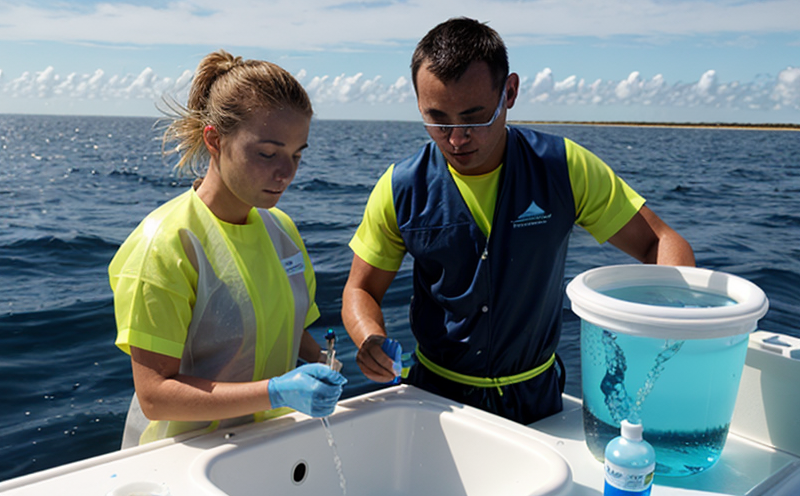ASTM D1976 Zinc Test in Seawater
The ASTM D1976 standard is a crucial method used to determine the total recoverable zinc content in seawater. This test is particularly important for industries such as marine engineering, environmental monitoring, and water treatment, where understanding the presence of zinc compounds can have significant implications.
Zinc contamination in seawater can arise from various sources including industrial discharges, agricultural runoff, and atmospheric deposition. The accurate quantification of zinc levels helps stakeholders comply with environmental regulations while also ensuring the integrity of marine ecosystems. This test is essential for quality managers looking to maintain water quality standards and for R&D engineers seeking to develop solutions that mitigate zinc contamination.
The ASTM D1976 method involves a series of steps designed to ensure accurate measurement. It begins with the collection of seawater samples, which should be representative and uncontaminated. The samples are then prepared by filtering them through appropriate filters to remove any particulates or other impurities that could interfere with the testing process.
Once the sample is prepared, it undergoes digestion in a strong acid environment to release all forms of zinc into solution. After this step, the sample is analyzed using flame atomic absorption spectrophotometry (FAAS) or graphite furnace atomic absorption spectrophotometry (GFAAS), both of which are highly sensitive and precise methods for detecting trace amounts of metal ions like zinc.
The accuracy and precision of the ASTM D1976 method depend heavily on the quality of the equipment used. Instruments such as the Thermo Scientific™ AAnalyst 800 series FAAS or PerkinElmer™ Optima 5300 DV GFAAS are commonly employed in laboratories to achieve the required level of accuracy and repeatability.
The standard specifies a range of concentrations for which it is applicable, typically between low parts per million (ppm) levels up to several hundred ppm. This wide range makes ASTM D1976 suitable for both routine monitoring as well as detailed analytical studies. The test results provide valuable data that can inform decision-making processes related to water quality management and environmental protection.
Compliance with this standard is not only beneficial for regulatory adherence but also enhances the reputation of organizations involved in marine activities or those responsible for managing coastal waters. By ensuring that zinc levels are within acceptable limits, these entities contribute positively towards maintaining healthy aquatic environments.
In summary, the ASTM D1976 Zinc Test in Seawater plays a critical role in environmental monitoring and industrial operations involving seawater use. Its ability to accurately measure zinc content makes it indispensable for quality managers, compliance officers, R&D engineers, and procurement personnel working across various sectors that intersect with marine environments.
Applied Standards
| Standard Number | Description |
|---|---|
| ASTM D1976-20 | This standard specifies a method for determining the total recoverable zinc in seawater. |
Benefits
- Ensures compliance with international environmental standards.
- Aids in maintaining water quality to protect marine ecosystems.
- Facilitates accurate measurement of zinc contamination levels for better management decisions.
- Supports research and development efforts aimed at mitigating zinc pollution.
Eurolab Advantages
At Eurolab, we pride ourselves on offering comprehensive seawater testing services that adhere strictly to the ASTM D1976 standard. Our team of experts ensures precision and reliability in every test conducted.
- We utilize cutting-edge instrumentation from leading manufacturers like Thermo Scientific™ and PerkinElmer™ to guarantee accurate results.
- Our laboratories are equipped with state-of-the-art facilities that comply with all relevant international standards, providing you with confidence in our methodologies.
- EuroLab’s extensive experience in water testing guarantees consistent quality across all projects we undertake.
- We offer rapid turnaround times for your samples, ensuring timely delivery of results when they matter most.





